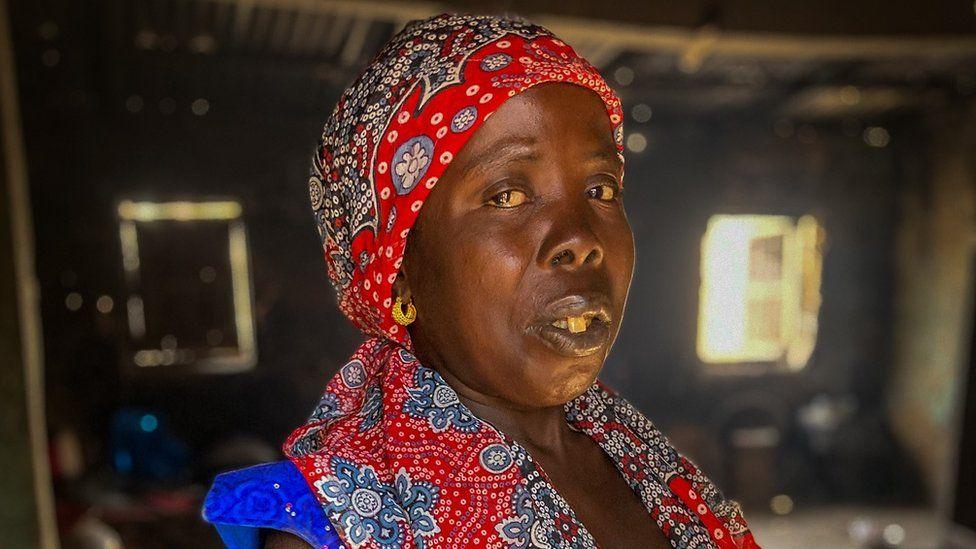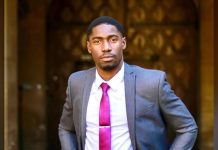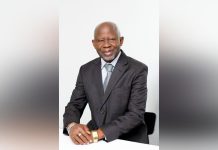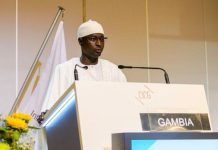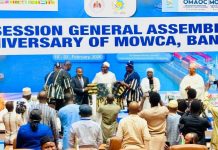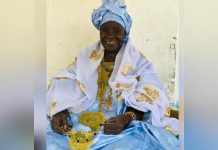Africa-Press – Gambia. For 22 years Gambians lived under the grip of former president, Yahya Jammeh, whose rule was marked by allegations of human rights abuses including killings, witch hunts and forced labour – although Mr Jammeh has previously denied wrongdoing. Since his shock election defeat more than five years ago, the country has been coming to terms with its painful history, including through the medium of art.
Terema Jeng was overcome with emotion when she first saw her photographs in the grounds of a museum called The Memory House. But it was not the usual despair and sadness she feels when she thinks about what she said was done to her family by the Yahya Jammeh regime in The Gambia.
Instead of tears, there were smiles. “I was so happy when I saw my portraits. They looked so beautiful. I couldn’t stop smiling that day.” Her radio technician husband, Sankung Balajo, died because of witch hunts allegedly meted out on the orders of Mr Jammeh.
They apparently started in 2009 after he blamed an aunt’s death on witchcraft and are thought to have occurred sporadically over seven years. They struck deep terror and divisions in communities in Gambia.
Ms Jeng’s images are part of a powerful series of portraits of 11 people who are sharing their stories of the horrific abuses they say they and their families suffered under Mr Jammeh, who was in power between 1994 and 2016. The exhibition, We Are Not Done, is on display in the courtyard of The Memory House – Gambia’s first ever memorialisation centre.
The building is run by the African Network Against Extrajudicial Killings and Enforced Disappearances (ANEKED), which is pushing for alleged human rights perpetrators to be brought to trial and was set up by filmmaker and human rights activist, Nana-Jo Ndow, a few years after a personal tragedy.
In 2013, her father Saul Ndow – a prominent businessman who often spoke out against Mr Jammeh – went missing while on a trip to Senegal, along with Mahawa Cham, a former politician he was travelling with.
In July 2019, one of the “Junglers” – a paramilitary group which reported directly to Mr Jammeh – confessed before a commission to investigate the Jammeh regime that he had buried Mr Ndow’s body on the president’s cashew nut farm in The Gambia.
According to Omar Jallow’s testimony, Mr Ndow had been abducted from Senegal and murdered on the orders of the then president. “His disappearance really shattered our family. It just broke us into pieces,” says Ms Ndow.
“Many people turned their backs on us. It’s like you have something that is contagious. You are also made to feel guilty.”
Ms Ndow found that other people, mostly women, experienced something similar. Her work at The Memory House now focuses on “making the invisible visible”, using visual story-telling as a tool to uncover and preserve the history of what happened during Mr Jammeh’s rule – and to help the healing process.
As well as photographs, The Memory House contains personal objects, like identity cards and outfits, of some of the people who were allegedly unlawfully killed and forcibly disappeared. The museum is also now on the list of sites approved by the Gambian education ministry where schools visit to learn about their country.
“Most of the students were born during the Jammeh era. So all they have known is a dictatorship,” says Sirra Ndow, Nana-Jo’s cousin who works alongside her. “And we need to make sure that the students know that dictatorship is not a normal system of government.”
Sirra Ndow calls it “unlearning a dictatorship”. It involves workshops in which younger people learn about human rights and transitional justice. The We Are Not Done portraits – taken on mobile phones by Rohey Cham, Fatou Ndure and Cecilia Wuday Sanyang – came out of such training.
During it, Ms Cham, 18, realised that she too had had her human rights violated. At the age of 10, she was supposed to go on a school trip to an historic site. Instead, the children were taken to Mr Jammeh’s farm in Kanilai and made to pick cashew nuts under the supervision of soldiers.
“I never thought that was forced labour, because I was so young.” Six out of the 11 stories documented by the photographers centre on witch hunts.
The victims were rounded up at gunpoint and taken to secret detention centres. They recounted being stripped naked, beaten, pressured into confessing to committing murders through witchcraft and forced to drink a hallucinogenic, herbal concoction. Some died.
Many of those featured in the exhibition are living with the physical after-effects, as well as flashbacks, crippling anxiety and depression caused by post-traumatic stress disorder.
Fatou’s mother was eight months’ pregnant when she was accused of being a witch and taken away by soldiers. She lost the child, and had at least two other miscarriages.
Fatou was bullied at school because of those accusations made against her mother, and had to leave when she was 10 years old. She ended up getting married when she was very young. While her husband is out at work, she spends the days alone: “I have no friends,” she said.
Fatou asked that her identity not be revealed – which is why the photographs of her on display were taken with her wearing a veil. Like many others in the exhibition, this is the first time Fatou has opened up about the witch hunt. Before, she was afraid of speaking about it because of fear “something worse would have happened” to her and her relatives.
She is not the only one. Many Gambians did not testify before the Truth, Reconciliation and Reparations Commission (TRRC), which heard witness testimony between January 2019 and mid-2021 about life under Mr Jammeh. Some because it was broadcast live and was therefore far too public a forum in which to talk of deeply disturbing incidents.
Others because they were frightened of possible repercussions. Mr Jammeh is in exile in Equatorial Guinea – but some of his henchmen remain in positions of authority in villages, in government, in the army and in the national intelligence service. Mr Jammeh may have left The Gambia, but the pain many feel his regime inflicted remains.
Life has been a real struggle for Ms Jeng ever since. She makes a little money by washing clothes. But she has been shunned and shamed by some people: “Our neighbours will not allow my children to eat with them because they said their father was a witch.”
But coming to The Memory House, seeing her portraits and her husband’s haftaan – a traditional outfit, which she has donated to the museum – has been cathartic for her. She feels that she is, finally, starting to recover. “This was my first time sharing my story and it has helped me heal a lot.”
Source: The Star
For More News And Analysis About Gambia Follow Africa-Press

